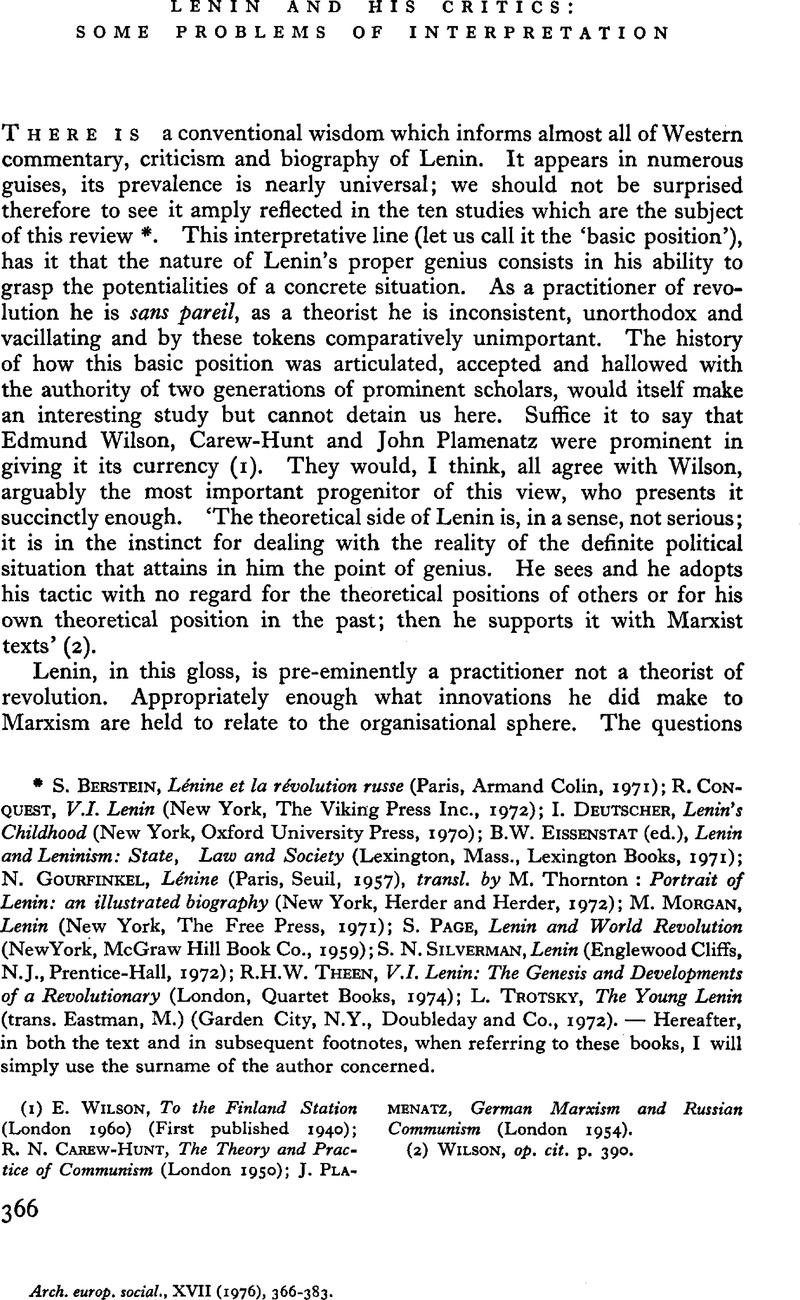Published online by Cambridge University Press: 28 July 2009

* Bebstein, S., Lénine et la révolution russe (Paris, Armand Colin, 1971)Google Scholar; Conquest, R., V.I. Lenin (New York, The Viking Press Inc., 1972)Google Scholar; Deutscher, I., Lenin's Childhood (New York, Oxford University Press, 1970)Google Scholar; Eissenstat, B.W. (ed.), Lenin and Leninism: State, Law and Society (Lexington, Mass., Lexington Books, 1971)Google Scholar; Gourfinkel, N., Lénine (Paris, Seuil, 1957)Google Scholar, transl. by Thornton, M.: Portrait of Lenin: an illustrated biography (New York, Herder and Herder, 1972)Google Scholar; Morgan, M., Lenin (New York, The Free Press, 1971)Google Scholar; Page, S., Lenin and World Revolution (New York, McGraw Hill Book Co., 1959)Google Scholar; Silverman, S. N., Lenin (Englewood Cliffs, N.J., Prentice–Hall, 1972)Google Scholar; Theen, R.H.W., V.I. Lenin: The Genesis and Developments of a Revolutionary (London, Quartet Books, 1974)Google Scholar; Trotsky, L., The Young Lenin (trans. Eastman, M.) (Garden City, N.Y., Doubleday and Co., 1972)Google Scholar. — Hereafter, in both the text and in subsequent footnotes, when referring to these books, I will simply use the surname of the author concerned.
(1) Wilson, E., TO the Finland Station (London 1960)Google Scholar (First published 1940); Cahew-Hunt, R. N., The Theory and Practice of Communism (London 1950)Google Scholar; Plamenatz, J., German Marxism and Russian Communism (London 1954)Google Scholar.
(2) Wilson, , op. cit. p. 390Google Scholar.
(3) Eissenstat, , op. cit.p. xGoogle Scholar.
(4) In Eissenstat, , op. cit. p. 242Google Scholar.
(5) This approach is nicely encapsulated in the title of Albert Weeks's essay in Eissenstat, op. cit., Peter Tkachev: The Forerunner of Lenin.
(6) Pipes, R., The Origins of Bolshevism, the Intellectual Evolution of Young Lenin, in Pipes, R. (ed.), Revolutionary Russia (London 1968)CrossRefGoogle Scholar.
(7) Leites, N., A Study of Bolshevism (Glencoe, III. 1953)Google Scholar; Wolfenstein, E. V., The Revolutionary Personality: Lenin, Trotin sky Gandhi (Princeton 1967)Google Scholar.
(8) Theen, , op. cit. p. 36Google Scholar
(9) In Eissenstat, , op. cit p. 66Google Scholar.
(10) Page, , op. cit. p. XIXGoogle Scholar.
(11) Ibid. p. XX.
(12) Ibid. p. XIX.
(13) Conquest, , op. cit. p. 33Google Scholar.
(14) Ibid. pp. 32–33.
(15) Ibid. pp. 10–11.
(16) Ibid. p. 32.
(17) Ibid. p. 4.
(18) See, e.g., Plamenatz, , op. cit.: ‘he never understood the intelligible parts of dialectical and historical materialism’ (p. 221)Google Scholar.
(19) Trotsky, , op. cit. pp. 169, 170Google Scholar.
(20) Trotsky, , op. cit. p. 159Google Scholar. Elizarova, A.E. Ulyanova, Vospominaniya o Vladimire Iliche Lenine, 3 vols. (Moscow 1956–1960)(hereafter Vosp. o V.I.L.), Vol. I, p. 21Google Scholar.
(21) For an account of Mikhailovsky's arguments see Mendel, A.P., Mikhailovsky, N.K. and his Criticism of Russian Marxism, The American Slavic and East Europea Review, XIV (1955), pp. 331–345CrossRefGoogle Scholar.
(22) See the accounts of this meeting in Vosp. o V.I.L., op. cit. vol. I, by Shesterina, C. Nevzorova, p. 142Google Scholar, and G.M. Krzhizhanovsky, p. 152; cf. Krupskaya, N., Memories of Lenin (London 1942), pp. 1–2Google Scholar.
(23) von Laue, Th., Legal Marxism and the ‘Fate of Capitalism in Russia’, The Review of Politics, XVIII (1956), p. 26Google Scholar.
(24) Liebman, M., Le léninisme (Paris 1973), 2 volsGoogle Scholar. English edition: Leninism under Lenin (London, Jonathan Cape, 1975)Google Scholar.
(25) Wolfe, B.D., in Eissenstat, , op. cit. pp. 293–311Google Scholar.
(26) Valentinov, N. (Volsky, N.), Encounters with Lenin (London 1968), p. 27Google Scholar.
(27) I have amplified the argument for regarding Lenin's, early writings as quite ‘orthodox’ in Lenin's, Early Writings—The Problem of Context, Political Studies. XXIII (1975). 442–458Google Scholar.
(28) Ascher, A., Pavel Axelrod and the Development of Menshevism (Cambridge, Mass. 1972)CrossRefGoogle Scholar.
(29) Both in vol. XII of Plekhanov, G.V., Sochineniya (Moscow 1923–1927), 29 volsGoogle Scholar.
(30) Kautsky, K., The Revision of the Programme of Social Democracy in Austria, Neue Zeit, I (1902), pp. 68–82Google Scholar.
(31) Garaudy, R., Lénine (Paris 1968), p. 20Google Scholar
(32) Lenin, V.I., What Is To Be Done? ed. by Utechin, S.V. (London, OxfordUniversity Press, 1963)Google Scholar.
(33) Quoted in Ascher, , op. cit. p. 208Google Scholar.
(34) Ibid. p. 213.
(35) Lenin, V.I., Collected Works in 45 vols.Google Scholar; English translation of the 4th Russian edition of the Sochineniya (Moscow 1960–1970)Google Scholar (hereafter C.W.), vol. I, p. 299. Cf. pp. 236–7 and C.W. III, p. 31.
(36) See especially C.W. IX, pp. 28–9 where Lenin inveighs against ‘the absurd and semi-anarchist ideas of giving immediate effect to the maximum programme, and the conquest of power for a socialist revolution. The degree of Russia's economic development (an objective condition) and the degree of class-consciousness and organisation of the broad masses of the proletariat […] make this impossible […] a socialist revolution is out of the question […] whoever wants to reach socialism by any other path than that of political democracy, will inevitably arrive at conclusions that are absurd and reactionary both in the economic and the political sense’.
(37) C.W.V, p. 484.
(38) Ibid. p. 489.
(39) Consider Gregory Guroff's assertion that Lenin ‘had little time for comment or analysis of specifically economic problems, […] Lenin did not set forth his own economic views or any observations about the future organization of a socialist economy’ (In Eissenstat, , op. cit. pp. 183–4Google Scholar).
(40) See Cohen, S.F., Bukharin and the Bolshevik Revolution (London 1974)Google Scholar, especially chapter 1 where Bukharin's indebtedness to Hilferding and Lenin's indebtedness to Bukharin is perceptively discussed.
(41) C.W. XXIV, p. 238.
(42) C.W. XXII, p. 303.
(43) C.W. XXIV, p. 460.
(44) C.W. XXIV, p. 67.
(45) C.W. XXV, p. 421.
(46) Buonarkoti's, , History of Babeuf's Conspiracy for Equality, trans. Bronterre, [O'Brien] (London 1836), p. 304Google Scholar.
(47) Morgan, , op. cit. p. 178Google Scholar.
(48) Lewin, M., Lenin's Last Struggle (London 1973)Google Scholar.
(49) Wildman, A.K., The Making of a Workers' Revolution (Chicago/London 1967)Google Scholar.
(50) Pipes, R., Struve, Liberal on the Left (Cambridge, Mass. 1970)Google Scholar.
(51) Getzler, I., Martov: a political biography of a Russian social democrat (Cambridge and Melbourne 1967)Google Scholar.
(52) Plamenatz, J., op. cit. p. 231Google Scholar.